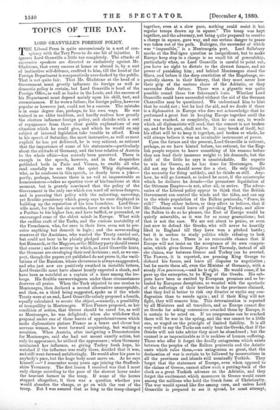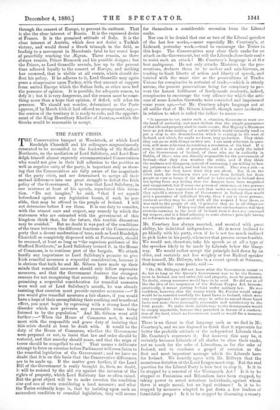TOPICS OF THE DAY.
LORD GRANVILLE'S FOREIGN POLICY.
THE Liberal Press is quite unconsciously in a sort of con- spiracy with the Tory Press to do one bit of injustice. It ignores Lord Granville a little too completely. The attacks of successive speakers are directed so exclusively against Mr. Gladstone, that every success at home or abroad is, by a sort of instinctive self-defence, credited to him till the head of the Foreign Department is comparatively over-looked by the public. That is not quite fair. That Mr. Gladstone at the head of a Government must greatly influence its foreign as well as domestic policy is certain, but Lord Granville is head of the Foreign Office, as well as leader in the Lords, and the success of his Department must depend mainly upon his skill, tact, and strenuousness. If he were a failure, the foreign policy, however popular or however just, could not be a success. The mistake is in some degree due, perhaps, to his own ways. He was trained in an older tradition, and hardly realises how greatly the electors influence foreign policy, and shrinks with a sort of repugnance from those clear public explanations of any situation which he could give, and which he would on any subject of internal legislation take trouble to afford. Even in his speech of Saturday, the most instructive, as well as most explicit he has yet delivered, he is very reticent, so reticent that the importance of some of his statements—particularly about the attitude of Germany, and the true relation of Austria to the whole affair—has scarcely been perceived. There is enough in the speech, however, and in the despatches published both in Paris and Vienna, to enable all who read carefully to see that the quiet Whig diplomatist, who, as he confesses in this speech, so dearly loves a joke-- partly, perhaps, because there is no veil so impenetrable as humorousness—takes no sportive view of his functions at this moment, but is gravely convinced that the policy of the Government is the only one which can ward off serious dangers, and is pursuing that policy with the unhasting, unresting, yet flexible persistency which gossip says he once displayed in building up the reputation of his iron foundries. Lord Gran- ville must, for the last six months, have stuck to his text like a Puritan to his higher law, and have baffled, or persuaded, or encouraged some of the ablest minds in Europe. What with the endless craft of the Turks, and the curious mutability of the Frenchmen, who, for once in their lives, seem not to per- ceive anything but demerit in logic ; and the never-ending reserves of the Austrians who wanted the Treaty carried out, but could not bear to la; plainly pledged even to do nothing, lest Bismarck, or the Magyars, or the Military party should resent that course ; and the secrecy in which, as Lord Granville hints, the Germans are enveloping their real decisions ; and, as we sus- pect, though the papers yet published do not prove it, the vacil- lations of the Russians, whose cleverness is always exaggerated, and who just now are positively swathed in invisible fetters, Lord Granville must have almost hourly expected a shock, and have been as watchful as a captain of a liner among the ice- bergs. His flexible unswervingness under those circumstances deserves all praise. When the Turk objected to one cession to Montenegro, then declared a second alternative unacceptable, and then, on a third being suggested, spoke as if the whole Treaty were at an end, Lord Granville calmly proposed a fourth, equally calculated to secure the object,—namely, a possibility of tranquillity in Montenegro. When France proposed, as her condition of action, that Greece should be cared for, as well as Montenegro, he was delighted ; when she withdrew that proposal under one of those bursts of apprehensiveness which make diplomatists picture France as a brave and clever but nervous woman he went forward acquiescing, but waiting a revulsion. When Austria' after instigating a Demonstration for Montenegro, said she had not meant exactly action, but only its appearance, he utilised the appearance ; when Germany minimised her influence, so giving Turkey fresh hope, he watched if the influence was really there, decided that it was, and still went forward unfalteringly. He would alter his pace to anybody's pace, but the huge body must move on. As he says himself :—" I remember many years ago joining the Stafford- shire Yeomanry. The first lesson I received was that I must only charge according to the pace of the slowest horse under the heaviest farmer in the troop. If some of the horses stopped altogether, it then was a question whether you would abandon the charge, or go on with the rest of the troop. But I was assured that as long as the troop charged together, even at a slow pace, nothing could resist it but regular troops drawn up in square." The troop was kept together, and the adversary, not being quite prepared to receive. a charge in square, gave way, and one serious danger to peace was taken out of the path. Dulcigno, the surrender of which was "impossible," is a Montenegrin port. Lord Salisbury mocks at the Dubigno question as insignificant, but to make Europe keep step in a charge is no small bit of generalship, particularly when, as Lord Granville is careful to point out, you have no right to dictate to the slowest farmer, and no power of punishing him ; and behind Montenegro stood the Slays, and before it the deep conviction of the Hapsburgs, re- peatedly shown in their history, that they must never lose their grip of the eastern shore of the Adriatic, or they surrender their future. There was a gigantic war quite possible round those few fishermen's huts. Whether Lord Granville could have succeeded without the aid of the German Chancellor may be questioned. We understand him to hint that he could not ; but he had the aid, and we doubt if there is a diplomatist in Europe who does not acknowledge that he performed a great feat in keeping Europe together until the end was reached, so completely, that he can say, in words which all diplomatists will read, that the concert is not broken up, and for his part, shall not be. It may break of itself, but his effort will be to keep it together, and broken or whole, he will always believe it was an invaluable instrument of power.
Upon the future and the present, Lord Granville is reticent, perhaps, as we have hinted before, too reticent, for the Eng- lish people require to know something of his reasons before they can lend their immense weight to his demands, but the drift of the little he says is unmistakable. He expects to win for Greece, as he has done for Montenegro. He did not say he should never fire a shot. He only thought the necessity for firing unlikely, and he thinks so still. Any- how, he will go forward, as indeed he must, if the catastrophe which he declares he dreads—the premature liquidation of the Ottoman Empire—is not, after all, to arrive. The adver- saries of the Liberal policy appear to think that the British Government can control the winds and the tides, and can say to the whole population of the Balkan peninsula, "Peace, be still l" They either believe, or they affect to believe, that if Mr. Gladstone would leave off provoking Turkey, and allow the Sultan to do as he pleases, the East of Europe would be quietly miserable, as it was for so many generations; but that is not the case. We are not about to praise, or even. just now to defend the Greeks, who will never be heartily liked in England till they have won a pitched battle ; but it is useless to study politics while refusing to look facts in the face. There is no reasonable chance that if Europe will not insist on the acceptance of its own compro- mise, which gives Greece Epirus and Thessaly, instead of all she claims, war between Greece and Turkey can be averted. The Powers, it is reported, are pressing King George to. disband his forces, and leave all disputes to negotiation ; but he meets them all, even the Minister of Germany, with a steady Non possumus,—and he is right. He would cease, if he gave up the enterprise, to be King of the Greeks. His sub- jects have been so excited by European promises and so be- fooled by European deceptions, so wearied with the spectacle. of the sufferings of their brethren in the provinces claimed,. that they feel it better to risk any disaster or excite any con- flagration than to recede again ; and if their King will not fight, they will remove him. This determination is reported by all Ministers and all travellers, and as Europe cannot fire' on Greeks for asking concessions awarded them by Europe, it is certain to be acted on. If no compromise can be reached there will be war in the spring, and the war cannot be a little one, or waged on the principle of limited liability. It is all very well to say the Turks can easily beat the Greeks, that if the Greeks will not take advice they must be abandoned ; but the counsel is as impracticable as it is reckless of human suffering. Those who offer it forget the deadly antagonism which exists between the peoples of the Balkan peninsula and the Asiatic caste which rules them,—an antagonism so great, that the declaration of war is certain to be followed by insurrections in all the provinces and islands still nominally Turkish. They 'forget that the statesmen of Europe, even when opposed to the claims of Greece, cannot allow such a putting-back of the clock as a great Turkish advance on the Adriatic, and they forget the excitement which massacres in Greece would cause among the millions who hold the Greek form of Christianity. The war would spread like fire among corn, and unless Lord Granville is prepared to see it spread, he must attempt,
through the concert of Europe, to prevent its outburst. That is also the clear interest of Russia. It is the expressed desire of France. It is the promised attitude of Italy. It is the clear interest of Austria, which does not desire a Turkish victory, and would dread a Greek triumph in the field, as leading to a movement in Macedonia fatal to her secret hope of peacefully reaching the /Egean. There remain, as there always remain, Prince Bismarck and his possible designs; but the Prince, as Lord Granville reveals, has up to the present time adhered loyally to the concert of Europe, and nothing has cceurred, that is visible at all events, which should de- flect his policy. If he adheres to it, Lord Granville may again press a compromise upon Turkey, with that amount of support from united Europe which the Sultan feels, as other men feel the pressure of opinion. It is possible, for adequate reason, to defy it ; but it is very dangerous, and the reason must be some- thing more than a hope that opinion, if defied, will relax its pressure. We should not wonder, determined as the Porte appears, if by March 15th it had offered an arrangement, say,— the cession of the territory it is ready to cede, and the appoint- ment of the King Hereditary Khedive of Jannina,—which the Greeks would be reasonable to accept.







































 Previous page
Previous page